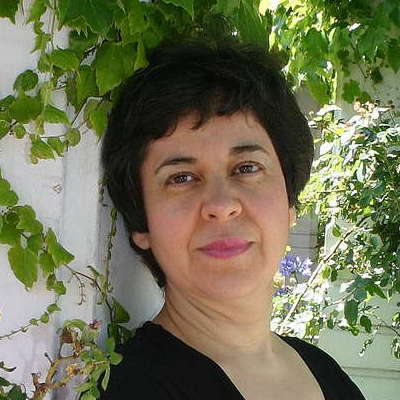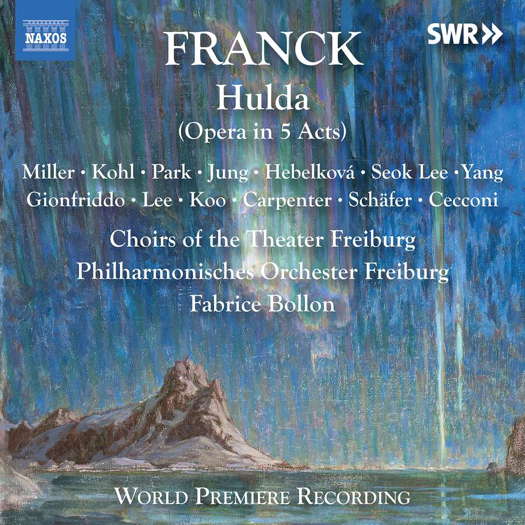- London Coliseum
- L'Italiana in Algeri
- P I Tchaikovsky
- Vivat Music Foundation
- Andreas Ludwig Priwin
- Antonio Maria Gasparo Sacchini
- Castelnuovo-Tedesco
- Austral String Quartet
 SPONSORED: A Seasoned Champion of New Music. Argentinian-American pianist Mirian Conti in conversation with Andrew Schartmann.
SPONSORED: A Seasoned Champion of New Music. Argentinian-American pianist Mirian Conti in conversation with Andrew Schartmann.
All sponsored features >>
 VIDEO PODCAST: James Ross and Eric Fraad discuss Streaming, Downloads and CDs with Maria Nockin, Mary Mogil, David Arditti, Gerald Fenech, John Daleiden, John Dante Prevedini, Lucas Ball and Stephen Francis Vasta.
VIDEO PODCAST: James Ross and Eric Fraad discuss Streaming, Downloads and CDs with Maria Nockin, Mary Mogil, David Arditti, Gerald Fenech, John Daleiden, John Dante Prevedini, Lucas Ball and Stephen Francis Vasta.

Shattered Lives
GERALD FENECH recommends Fabrice Bollon's recording of César Franck's opera 'Hulda'
'Sensational operatic discovery in an electrifying performance that sizzles with some superb singing and brilliant orchestral playing.'
César Franck (1822-1890) was born in Liege (now in Belgium), but he spent the greater part of his life and career in Paris, which is why many people regard him as a French composer. He is famous for his organ, choral, chamber and to some extent symphonic works, but one hardly gives a thought that Franck also tried his hand at the operatic genre. In this respect, his output is lean indeed; he only wrote four operas, but nonetheless, his contribution is starting to be considered as essential to the development of French opera in the twentieth century.
His stage works are: Stradella (1841-2), Le Valet de Ferme (1851-53), Hulda (1882-85) and Ghiselle (1889). The subject of this review is the third in line.
Listen — Franck: Prelude (Hulda)
(CD1 track 1, 0:38-1:35) ℗ 2021 Naxos Rights (Europe) Ltd :
Hulda is a five-act opera to a libretto by Charles Grandmougin, and is set in eleventh century Norway. It was premiered in an incomplete version in Monte Carlo on 8 March 1894, but it received a mixed reception, and the piece has really struggled to make some kind of mark on critics and public alike. This total neglect is strange indeed, as the music is in the Wagnerian mould both in the writing for brass and also in the love duets, which are reminiscent of Tristan und Isolde.
Listen — Franck: C'est lui! (Hulda Act III)
(CD2 track 5, 0:00-0:53) ℗ 2021 Naxos Rights (Europe) Ltd :
Franck's writing shows his seriousness of expression and characteristic chromatic harmony. The story tells how Hulda seeks revenge on Aslak and his clan, who killed her family. The subject depicts a young woman as a victim, her faith in nature, her destiny, and women's suffering at the hands of men.
In Act I we see Hulda and her mother praying for the return of their men from hunting. In the meantime the Aslaks celebrate the murder of the Hustawicks, and Gudleik manifests his lust for Hulda. The girl curses her enemies and vows revenge.
Act II opens on the events of two years later. Hulda is to be married to Gudleik, and Gunnard is to marry Thordis. Gudleik and his brothers are heard arguing over Hulda, until Gudrun forces them to show more respect. Hulda, in the meantime, has seen Eiolf, an emissary of the Norwegian King, and is infatuated by him. The wedding party assembles, but just then Eiolf arrives. He and Gudleik engage in a fight to the death in which Gudleik is slain.
Act III opens with Aslak and Gudrun grieving for Gudleik. As evening sets, Hulda and Eiolf meet to exchange their feelings. The girl manages to convince Eiolf to return with her to her homeland. As he leaves her for the night, Arne, one of Aslak's sons, enters and seduces Hulda. Just then, Old Aslan sees a man defiling Hulda and kills him. Horrified, he discovers that he has killed his own son. The girl's curse is indeed working.
Act IV is set against a Springish background. Celebrations are afoot to welcome the new season. Swanhilde, Eiolf's lover, is still upset by the betrayal of her man, but her friend Thordis promises to re-unite them. Eiolf enters and embrances Swanhilde, while Hulda, who is close at hand, sees his betrayal of her. Furious, she asks the remaining Aslak brothers to kill him, something they plan to do the next day.
Listen — Franck: La violence de ma haine (Hulda Act IV)
(CD3 track 9, 0:00-0:41) ℗ 2021 Naxos Rights (Europe) Ltd :
In the last Act, Hulda does get her revenge but, as the deed is ended, the Aslaks turn on her. As she throws herself into the fjord, the men turn away in fear - a story that reminds one of Wagner's Ring and Sibelius' Kullervo.
Listen — Franck: La violence de ma haine (Hulda Act IV)
(CD3 track 15, 2:08-3:08) ℗ 2021 Naxos Rights (Europe) Ltd :
Franck's music portrays raging clans, bloodthirsty murderers and shattered lives, but moments of tenderness and lyrical beauty are not at a premium. Indeed, the role of Hulda can be placed among the great tragic stage heroines, and the composer's biographer Joel-Marie Fauquet had this to say about the music:
A high-flying score brimming with invention, with a gripping evocative force, and a lyrical quality of the highest order'.
This was what conductor Fabrice Bollon has to say on this world premiere recording of the original complete version of the work:
Discovering Franck's grand opera 'Hulda', complete with ballets, as a very dramatic and powerful story, I was first dazzled by the beauty and the deep human realism of his two love duets. Reading the whole score, suddenly each scene enjoyed its own function and dramatic power, revealing that Franck indeed wrote a really great opera, but one which was not understood in his time. This is not only a recording of the score's original version, but also a performance of a very high quality-work, one that is worthy of joining other major operas in the repertoire.
Sensational operatic discovery in an electrifying performance that sizzles with some superb singing and brilliant orchestral playing. Bollon's peerless conducting completes a near perfect version that should serve as the benchmark for future stagings. A blockbuster of a set for all opera lovers.
Copyright © 1 November 2021
Gerald Fenech,
Gzira, Malta

CD INFORMATION - FRANCK: HULDA
MORE ARTICLES ABOUT CÉSAR FRANCK


